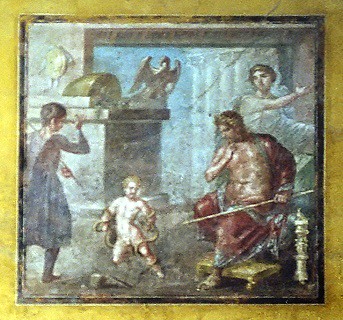Ὁ Ἡρακλῆς (ἐκ δεξιῶν) καὶ ὁ Ἰόλαος (ἐκ εὐωνύμων (ἀριστερῶν)) ὁ ἀδελφιδοῦς αὐτοῦ.

Ἀγγλικὴ μετάφρασις τοῦ ἔργου (τοῦ ποήματος). (ἴδ. σελ. σκ' καὶ τὰς ἐπομένας).

ΒοηθήματαἩσιόδου, <<Ἀσπὶς Ἡρακλέους>>, στοιχ. α'-γ'. wrote:ἢ οἵη προλιποῦσα δόμους καὶ πατρίδα γαῖαν
ἤλυθεν ἐς Θήβας μετ᾽ ἀρήιον Ἀμφιτρύωνα
Ἀλκμήνη, θυγάτηρ λαοσσόου Ἠλεκτρύωνος:


The metrical configuration of the ends of the second and third lines is noteworthy. Both lines have the common word-end - the so-called "bucolic diaeresis" - at the end of the fourth foot, and in both the sequence of a dactyl and spondee/trochee is filled by a single proper name. But while Ἀμφιτρύωνα fills the bill in line two quite adequately, Ἠλεκτρύωνος is awkward in the dactyl: it should scan as Ἠ-λεκτρ-ύ-ω-νος but the three consonants following λε- should make that syllable long (the τρ is not problematic, but κτρ won't quite work. It would appear that the composer has here failed to get meter and phrase together. Greek proper names are not infrequently stumbling-blocks for versifiers.Ἡσιόδου, <<Ἀσπὶς Ἡρακλέους>>, στοιχ. α'-γ'. wrote:ἢ οἵη προλιποῦσα δόμους καὶ πατρίδα γαῖαν
ἤλυθεν ἐς Θήβας μετ᾽ ἀρήιον Ἀμφιτρύωνα
Ἀλκμήνη, θυγάτηρ λαοσσόου Ἠλεκτρύωνος:
"Or as she abandoned permanent dwellings and her native landἩσιόδου, <<Ἀσπὶς Ἡρακλέους>>, στοιχ. α'-γ' wrote: ἢ οἵη προλιποῦσα δόμους καὶ πατρίδα γαῖαν
ἤλυθεν ἐς Θήβας μετ᾽ ἀρήιον Ἀμφιτρύωνα
Ἀλκμήνη, θυγάτηρ λαοσσόου Ἠλεκτρύωνος:
She easily exceeded the femininity of the women of the worldἩσιόδου, <<Ἀσπὶς Ἡρακλέους>>, στοιχ. δ'-η' wrote: ἥ ῥα γυναικῶν φῦλον ἐκαίνυτο θηλυτεράων
εἴδεΐ τε μεγέθει τε: νόον γε μὲν οὔ τις ἔριζε
τάων, ἃς θνηταὶ θνητοῖς τέκον εὐνηθεῖσαι.
τῆς καὶ ἀπὸ κρῆθεν βλεφάρων τ᾽ ἄπο κυανεάων
τοῖον ἄηθ᾽ οἶόν τε πολυχρύσου Ἀφροδίτης.